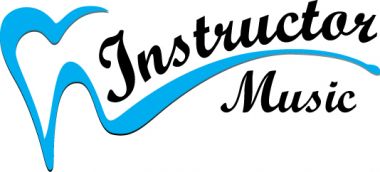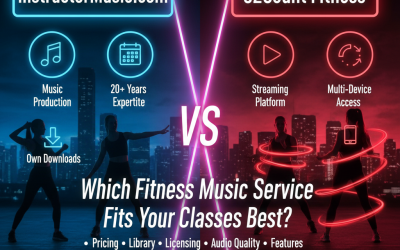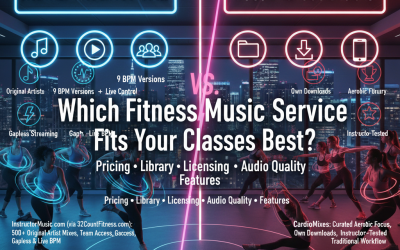
One of the best things about being a group fitness instructor is you get to choose the type of music you play during your classes. Want your clients to warm up? Pick a beat that gets their blood pumping. Ready for a good cool down? Use background music that is slow and relaxing.
That said, you can’t just download music from a website or CD and use it. The music industry does have certain protections related to copyright infringement. What does this mean for your fitness business?
What the Law Says About Music Licensing for Group Fitness Classes
Any time you play music for your class that you did not personally write or record, you need a public performance license (PPL). This license is an agreement between you and the copyright owner of the recorded music. It complies with the Copyright Law of the United States and allows you to play the song in your fitness class.
This license is needed even if you don’t intend on playing the entire song. It is also required if the music was created for a television show or movie. Again, if you did not create the music, you must purchase a license.
What if you purchased the music by buying the CD or via iTunes, Spotify, or some other online platform? Do you need to buy music licensing then? The answer is yes. Proper licensing is always required before you can play a particular song.
The only time you do not have to buy a PPL license is if the music is public domain. This includes songs published before 1925 and songs with no known composers. Some folk songs are also public domain.
The Public Domain Information Project offers an online search or use Royalty Free Music for music you can play publicly without purchasing a license. Though they are limited, you might find some tunes that will work for your group classes.
Consequences of Using Copyrighted Music without a License
The last thing you want to do is work hard to grow your personal training business, only to face consequences for playing music without a license. What happens if you violate copyright law? You’ll likely be socked with huge fines.
For example, on March 19, 2019, the National Music Publishers’ Association reported that it filed a lawsuit against Peloton for using its members’ music without a license. The amount of money sought exceeds $150 million.
Other businesses have been hit with lawsuits for the same reason. In some cases, the courts have ordered that they pay tens of thousands of dollars in fines. Purchasing a public performance license removes this risk.
Who Is Responsible for Acquiring the Music License?
If you are opening your own gym or the owner of a pre-existing fitness business, you are responsible for the music license. Conversely, if you are an employee who receives a paycheck as a fitness instructor or personal trainer, it is up to the company you work for to obtain licensing for your workout playlist.
It is important to note that, as an employee, it is still your responsibility to make sure music licensing has been obtained before playing your desired playlist. If your employer hasn’t met licensing requirements, you can still be held liable in court.
How to Obtain a Public Performance License for Your Group Fitness Classes
Public performance licenses are purchased from a Performing Rights Organization, or PRO. PROs represent all the people involved in making a tune or song. This includes the songwriter, publisher, and any other copyright owner that is due part of the proceeds.
Here’s where it can get a bit confusing. Not all copyright owners use the same PRO. Therefore, you must contact the PRO with licensing authorization over the specific music you want to use. If you are a fitness professional or gym owner in the U.S., there are four PROs to consider:
- American Society of Composers, Authors and Publishers (ASCAP). ASCAP offers music licensing for fitness facilities. It represents more than 715,000 copyright owners and millions of songs. Performers licensed with ASCAP include Beyoncé, Harry Styles, Doja Cat, and the Artist Formerly Known as Prince.
- Broadcast Music Inch, or BMI. Another option is BMI. In operation for more than 75 years, this PRO represents over 1 million copyright owners and 15 million protected works. A BMI license provides access to music by Post Malone, Roddy Ricch, Maren Morris, and Bob Seger.
- Global Music Rights. The smallest PRO of the group, Global Music Rights represents around 83 songwriters and over 45,000 works. A few of the better-known artists include John Lennon, Ziggy Marley, Billy Idol, Bruce Springsteen, and John Mayer.
- SESAC. The fourth PRO is SESAC. This licensing agency represents 30,000 copyright owners and more than 1 million songs. If you plan to use music by Bob Dylan, Zac Brown, or RUSH, you can do it via SESAC. SESAC also offers music from well-known television shows such as Grey’s Anatomy and Seinfeld.





0 Comments